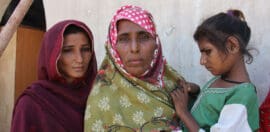Oxfam staff cuts highlight struggles across foreign aid sector

4 May 2020 at 6:11 pm
The organisation says it is struggling to stay afloat financially amid the outbreak of coronavirus
The foreign aid sector has been hit by a tsunami of challenges, sector leaders say, as Oxfam Australia prepares to slash close to half its workforce.
On Saturday, the Guardian reported that a decision had been made by Oxfam Australia to redesign how the organisation would run, with plans to cut the number of full-time staff from 185 to 94 by October.
The charity, which delivers aid internationally as well as in Aboriginal and Torres Strait Islander communities in Australia, pointed to ongoing financial issues and a persistent decline in overseas aid budgets from before the outbreak of COVID-19.
Lyn Morgain, Oxfam Australia’s CEO, told Pro Bono News safeguarding the work in Australia and in Indigenous communities was the priority.
“We’ve tried to ensure that the work that is happening in the country and in our First Nations program here in Australia is protected from these changes,” Morgain said.
“It does mean, however, that many of the activities that people might be familiar with Oxfam undertaking here in Australia and indeed globally may need to be suspended for some time while we work out how best we might resource those going forward.”
More than just the pandemic
Oxfam Australia’s financial woes are not a new development. Morgain said that both the summer bushfires and the outbreak of coronavirus had come at a difficult time for the already struggling organisation.
“Oxfam and the sector generally have been experiencing declines in income for some time, so we recognise that there is a need to redesign our model to take account of that,” she said.
Mid-last year, the charity announced it was closing all its retail stores due to declining revenue, with 2018-19 down nearly $11 million compared with the previous year’s revenue.
Oxfam also said in its 2019 annual report that it was disheartened by further reductions in the Australian government aid program.
“In the coming year, we will press on with our efforts to advocate for an increased aid budget,” the report said.
Strain felt across entire foreign aid sector
Paul Ronalds, the CEO of Save the Children, told Pro Bono News that the outbreak of COVID-19 had exacerbated existing issues across the entire foreign aid sector.
“Prior to COVID-19, there were already too many charities chasing too few dollars, using pretty much the same business model in a sector that has been experiencing declining fundraising returns for pretty much a decade or so,” Ronalds said.
“On top of all of those problems, we’ve also now got the lowest foreign aid budget in Australia’s history. So it really is a tsunami of challenges that are all pretty much impacting at once.”
He said that foreign aid charities were playing a pivotal role in the pandemic and would well after it.
“We’ve started to see the first few cases of COVID 19 getting into places like the Rohingya refugee camps in Bangladesh, in the slums in and around Dhaka, and in Syrian refugee camps, so Save the Children are madly scrambling to change our programming and adapt it to provide a whole range of health messages,” he said.
“I’m hopeful that one of the things that might come out of this is an appreciation for the common good, if you like, that foreign aid provides to all of us, and not just in the interests of people in low income countries.”
Morgain added that wealthy countries such as Australia needed to play their part in contributing to the global responses such as the United Nations $2 billion fund to manage the pandemic.
“Australia’s fair share of that response would be $84 million, so we’re absolutely urging the government to contribute to that fund,” she said.
“And the position we’re taking is that we’re not going to have a safe world until everybody is safe.”







